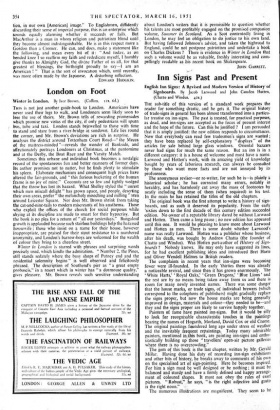American Proconsul
The Riddle of MacArthur. By John Gunther. (Hamish- Hamilton. 12$. 6d.) Mosr Englishmen are unaware that there is any riddle of MacArthur. They know him primarily as Commander-in-Chief of the United Nations forces in Korea, in which capacity he has one considerable victory to his credit and one even more con- siderable defeat to his discredit. His military reputation therefore breaks about even. But as the British public likes its generals to be slightly inarticulate and not to meddle in politics, MacArthur, who is both rhetorician and politician, starts off with a prejudice in his disfavour. It will not be the least merit of Mr. Gunther's calm and able study if it reminds readers in this country that neither the General's conduct of the Korean war nor his prose style is an essential element in his claim to fame. What this claim does rest on is his record as head of the Occupation Forces in Japan.
In his proconsular capacity General MacArthur is a fascinating figure. As Mr. Gunther points out, the authority with which he is invested is of a sort which has never before come the way of an American. Mr. Gunther compares him to Clive, Curzon, Warren Hastings and Cecil Rhodes ; MacArthur's own subordinates on occasion compare him to Alexander the Great (to Alexander's dis- advantage). But probably Cromer provides a better analogy than any of these. Both MacArthur and Cromer found themselves responsible for the government of a defeated and disorganised nation ; both embarked on reform with the enthusiasm of which only an aristocrat is capable ; both chose to exercise power through indigenous governments ; both found the success of their endeavours imperilled by outside military campaigns which were forced on them. And both proconsuls had in the background the ultimate sanction of an army of occupation to back up their policies.
There are, of course, considerable differences between Cromer's efforts to insinuate nineteenth-century liberalism among the Egyptians and MacArthur's attempt to force twentieth-century Americanism on the Japanese. MacArthur's technique, though much more subtle than might have been expected, is brusque compared with Cromer's. But it must be remembered that he is working against time against the signing of a peace treaty, against Japanese restiveness, and against his own old age. It is easy to find grounds for amusement in the pace at which Japan is being refashioned ; in the hurricane of democracy, Christianity, soft drinks, sanitation, motion-pictures, contraceptives, intelligence-tests, trade unions and so forth which have flooded the country. But the same hurricane has, brought habeas corpus, has abolished the secret police, and stirred up a general sense of freedom which was previously unknown. Even it none of these survive MacArthur's departure,, it would still have been worth trying to make the Japanese accept them. And MacArthur works on the not unreasonable axiom that, as Mr. Gunther puts it, " once a people have tasted freedom, they will never permit it to be removed." MacArthur's passionate belief in the principle of freedom ought to have generated some sympathy for him among his allies. Why has it failed to do so ? It may be that, as Mr. Gunther says, " the MacArthur story is one of the worst-reported stories in historYT but equally important is the fact that, as Mr. Gunther himself discovers, however well you tell the story, a large part of it remains incorrigibly unattractive. It is not just the General's histrionics and egoism, his terrible prose and his terrific profile, which make him hard to admire as he deserves ; there is a real danger that h!,1 inflexible, grandiose optimism will undo the good effects of his regime ; that, by trusting in his divine sense of mission, he will provoke an inevitable reaction in the course of which his work will be swept away. For what MacArthur is trying to do is. to quote Mr. Gunther, "to remake an entire nation, an entire civilisa-
tion, in our own [American] image." To Englishmen, diffidently discarding their sense of imperial purpose, this is an enterprise which sounds equally alarming whether it succeeds or fails. But MacArthur is a man in whom religion and patriotism blend until they become almost indistinguishable. He is in this respect more a Gordon than a Cromer. He can, and does, make a statement like the following, and mean every bit of it: " And today, as on bonded knee I so reaffirm my faith and rededicate myself, 1 humbly give thanks to Almighty God, the divine Father of us all, for that greatest of blessings, the birthright proudly to say—I am an American ! " That is the sort of invocation which, until recently, was more often made by the Japanese. A disturbing reflection.
EDWARD HODGKIN.











































 Previous page
Previous page